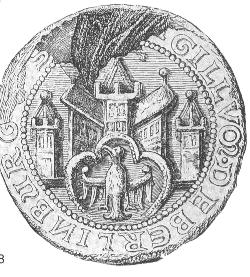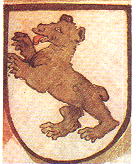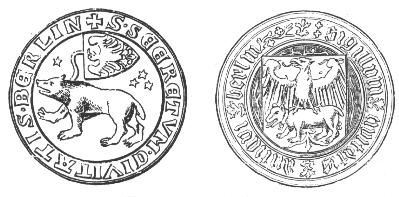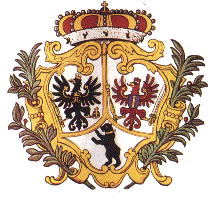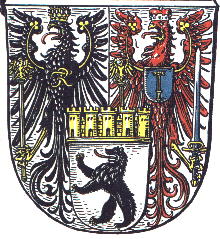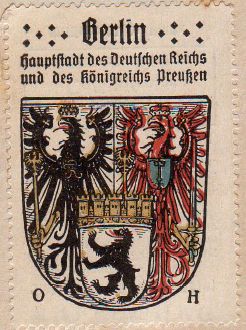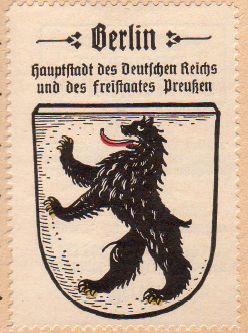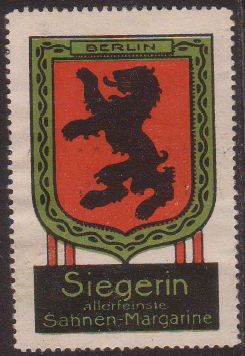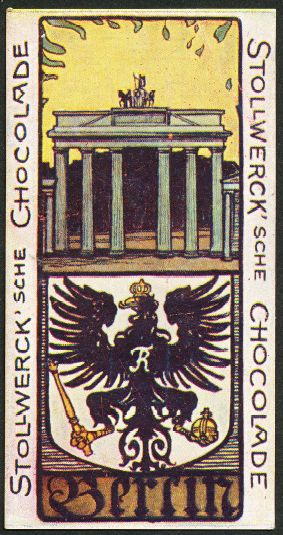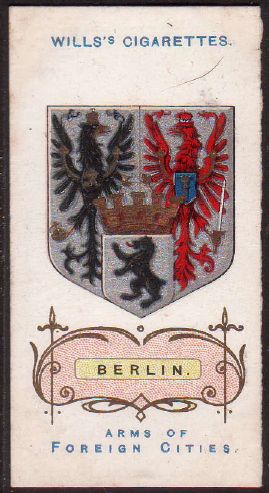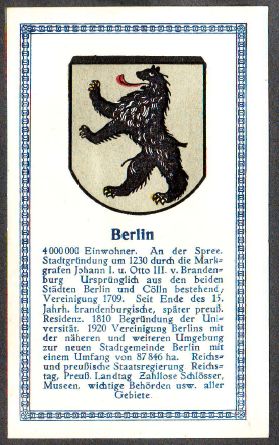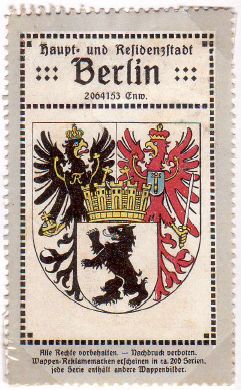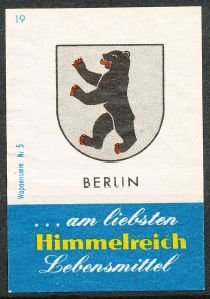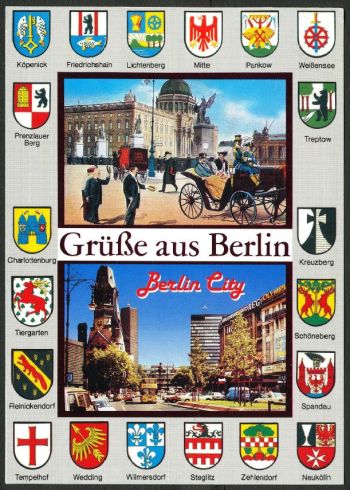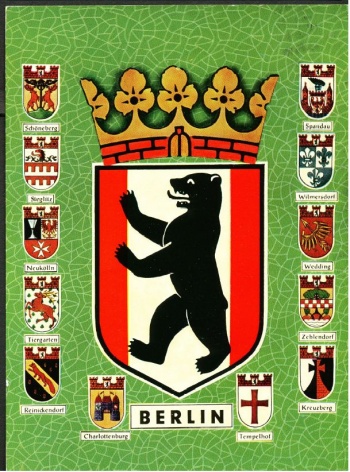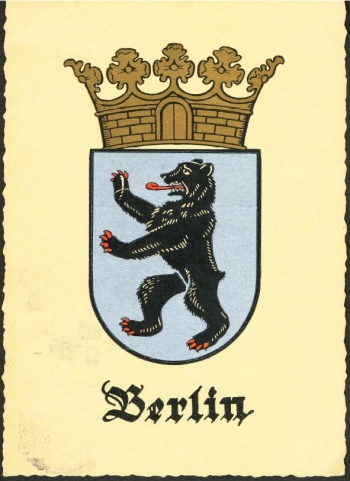Berlin: Difference between revisions
Knorrepoes (talk | contribs) No edit summary |
Knorrepoes (talk | contribs) m (Text replacement - ".hagd.jpg|center]] <br/>The arms by Hupp in the Kaffee Hag albums +/- 1925" to ".hagd.jpg|center|Wappen von {{PAGENAME}}]] <br/>The arms by Hupp in the Kaffee Hag albums +/- 1925 ") |
||
| Line 52: | Line 52: | ||
{|align="center" | {|align="center" | ||
|align="center"|[[File:berlin-1.hagdo.jpg|center]] <br/>The arms in the [[Kaffee Hag albums]] +/- 1918 | |align="center"|[[File:berlin-1.hagdo.jpg|center]] <br/>The arms in the [[Kaffee Hag albums]] +/- 1918 | ||
|align="center"|[[File:berlin.hagd.jpg|center]] <br/>The arms by [[Otto Hupp|Hupp]] in the [[Kaffee Hag albums]] +/- 1925 | |align="center"|[[File:berlin.hagd.jpg|center|Wappen von {{PAGENAME}}]] <br/>The arms by [[Otto Hupp|Hupp]] in the [[Kaffee Hag albums]] +/- 1925 | ||
|align="center"|[[File:berlin.sieg.jpg|center]] <br/>The arms on a [[Siegerin Margarine]] card | |align="center"|[[File:berlin.sieg.jpg|center]] <br/>The arms on a [[Siegerin Margarine]] card | ||
|- | |- | ||
Revision as of 07:35, 1 March 2016
This page is part of the German heraldry portal Deutsche Wappensammlung |
Heraldry of the World |
|
German heraldry:
|
Selected collector's items from Germany:
|
BERLIN
State : Berlin
Additions : before 1850 : Dorotheenstadt, Friedrichstadt, Friedrichswerder, Luisenstadt, Königsstadt, Spandauer Vorstadt; 1861 Moabit, Tiergarten, Wedding; 1920 Buch, Buchholz, Charlottenburg, Friedenau, Friedrichsfelde, Friedrichshain, Friedrichshagen, Heiligensee, Hellersdorf, Hermsdorf, Hohenschönhausen, Johannisthal, Köpenick, Lankwitz, Lichtenberg (1912 Boxhagen-Rummelsburg), Lichterfelde, Lübars, Mahlsdorf, Marienfelde, Marzahn, Müggelheim, Neukölln (Rixdorf), Niederschönhausen, Oberschöneweide, Pankow, Rahnsdorf, Reinickendorf, Rosenthal, Schmargendorf, Schmöckwitz, Schöneberg, Spandau, Steglitz, Stralau, Tegel, Tempelhof, Treptow, Weissensee (1905 Neu-Weissensee),Wilmersdorf, Wittenau, Zehlendorf, Adlershof, Biesdorf, Blankenburg, Blankenfelde, Dahlme, Falkenberg, Frohnau, Gartenfeld, Gatow, Giesensdorf, Grünau, Grunewald, Grunewald-Forst, Haselhorst, Heinersdorf, Hessenwinkel, Karolinenhof, Karow, Kaulsdorf, Kladow, Klein-Glienecke, Malchow, Mariendorf, Niederschöneweide, Nikolassee, Pfaueninsel, Pichelsdorf, Staaken, Steinstücken, Waidmannslust, Wannsee, Wilhelmshagen, Wilhelmsruh
Arms of Berlin districts:
Old districts which have never been separate municipalities : Kreuzberg, Berlin-Mitte, Prenzlauer Berg
Districts since 2001 : Charlottenburg-Wilmersdorf, Friedrichshain-Kreuzberg, Marzahn-Hellersdorf, Steglitz-Zehlendorf, Tempelhof-Schöneberg, Treptow-Köpenick
Origin/meaning
Berlin and its neighbouring village Kölln/Cölln were two fishing villages that received city rights in 1230 and were united in 1307 for the first time (only in 1709 Kölln became finally a part of Berlin). The city gradually gained importance and was one of the major cities in Brandenburg.
In 1701 it became the capital of Prussia, in 1871 of Germany. Between 1945 and 1989 the city was divided and at present it is again the capital of Germany.
The oldest seal of Berlin dates from 1253 and shows the eagle of Brandenburg in front of a city wall (see also Spandau).
| The oldest seal of Berlin (1253) |
In 1280 on the new great seal the complete arms of the Dukes of Brandenburg are shown. On both sides of these arms a small shield appears, on which the canting bear can be seen. Soon afterwards the bear became the main symbol of the city. The bear also appears on medieval rolls of arms (see below).
| The arms of Berlin in a medieval roll of arms |
On a seal from 1388 the bear has the arms of Brandenburg hanging on its neck, in 1448 the eagle appears on the back of a walking bear. The bear as the sole symbol does not appear on seals before 1618. Before that date it appeared as the sole symbol on coins and rolls of arms.
| The seals of Berlin from 1338 and 1460 |
After the merger with the cities Kölln, Friedrichswerder and Dorotheenstadt in 1709, the bear became the main symbol. It was shown in a point, with the eagle of Brandenburg and the red eagle of Kölln above the point.
| The arms of Berlin in 1780 |
In 1839 the point was replaced by a small shield with the bear and a mural crown on the shield. The small arms of the city still only showed the bear.
| The arms of Berlin in 1839 |
After the declaration of the Republic in 1918 the arms of Brandenburg were removed and the bear was again the sole arms of the city. After Berlin had become a State within the German Federal Republic, the arms of the city were also used as arms of the State. At present the united Berlin again uses only the bear as the arms of city and State.
Use of the arms on different collector's items
| The arms in the Kaffee Hag albums +/- 1918 |
The arms by Hupp in the Kaffee Hag albums +/- 1925 |
The arms on a Siegerin Margarine card |
| The arms in the Stollwerck series (actually the Prussian arms) |
The arms in a British cigarette card |
The arms in the Abdulla-Deutsche Städtewappen album 1928 |
| The arms on a cinderella, around 1900 |
The arms on a matchbox label, 1960s |
A series of matchbox labels with all West-Berlin arms can be seen here.
Some heraldic postcards with the arms of Berlin:
Contact and Support
Partners:
Your logo here ?
Contact us
© since 1995, Heraldry of the World, Ralf Hartemink 
Index of the site
Literature : Stadler, 1964-1971, 8 volumes; Machatscheck, 1987; Vogel, 1987



